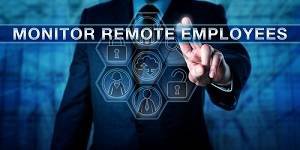
HOW MUCH EMPLOYEE SUPERVISION IS TOO MUCH?

There are a wide variety of reasons employees need supervision. Theft is a crime of opportunity, and proper control can alleviate that option. Also, when a supervisor is watching, work output productivity increases. When using company issued devices, without proper checks the device may be utilized for unintended purposes. However, there must be a balance of supervision and freedom. Otherwise, an organization can be open for unethical business practices lawsuits.
COMPANY ISSUED PRODUCTS
An increasing number of Americans are working from home. For some employees, their home may be the primary workplace. Other employees may bring work home that they could not complete during regular business hours. For these employees, cell phones, laptops, and other devices are often given. Others are issued company cars to travel to and from work as well as to offsite business locations. Although these may be convenient for the employee and a welcomed bonus, situations such as these can blur the line between work and home. When does monitoring of these devices stop?
THE LEGAL SITUATION
If the product belongs to the employer, then the employer is legally allowed to monitor usage at any time, including when the employee is off-the-clock, even if the company says that they will not monitor. In several cases, the Supreme Court has upheld that there is no reasonable expectation of privacy in a workplace or using company devices, despite what the handbook and the employer have previously stated. There are two exceptions to this rule:
Audio monitoring: Federally, a business has the right to listen in on business related phone calls and even record them without given notice, however, an employer must hang up if they realize that the call is personal in nature; and
Video surveillance: If the recording occurs in a public area, then legally it is valid, but areas that have a reasonable expectation of privacy, such as bathrooms and locker rooms, are said to be off-limits. However, in the past, even these areas have been deemed okay when the issue came to court.
Keep in mind that just because you are legally able to do something does not mean that you should. If your business is doing well and your employees have proven their integrity, perhaps building a strong moral is more important than constant monitoring. If you are an employer under attack for the use of surveillance devices, the accusation alone is enough to harm a reputation, no matter the legality of the issue. Resolving the dispute as soon as possible is the best method for preventing any unwanted effects.
Understanding your rights as a business owner and employer is essential to protect your business. If you are interested in discussing your surveillance rights and responsibilities with an experienced San Jose, CA business attorney, contact The Law Offices of Steven E. Springer today for your free 20-minute initial consultation. With offices in San Jose, Morgan Hill, and Fremont, we are conveniently located to serve you. Call today at 408-779-4700 or 510-791-7137.
Source:
